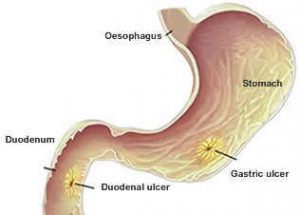PEPTIC ULCER
Ulcerations (sores) in the lining of upper part of the digestive tract are known as Peptic Ulcers. The ulcers may exist in the lower part of food pipe (oesophagus), in the stomach or in the initial part of the intestine (duodenum). About 10% of all adults are affected with Peptic ulcers at some time in their life. The incidence of Peptic ulcers is more common in males as compared to females.
Causes of Peptic Ulcer:
The underlying process that results in Peptic ulcer formation is excess of acid production in the stomach and damage to the protective barrier inside the stomach. Certain things that can trigger excess acid production or can cause damage to the protective lining of the stomach are:
- Emotional stress
- Foods (spices, pungent foods, etc)
- Overuse of certain drugs, especially NSAIDs (Non-steroidal anti-inflammatory drugs)
- Infections (H-Pylori)
- Hereditary
- Smoking
Types of Peptic Ulcers:
 Peptic ulcers usually run a chronic course and complaints tend to be episodic in nature; the patient is usually free from the symptoms in between these episodes. Some of the common symptoms of Peptic ulcers are:
Peptic ulcers usually run a chronic course and complaints tend to be episodic in nature; the patient is usually free from the symptoms in between these episodes. Some of the common symptoms of Peptic ulcers are:
- Pain in the epigastrium (upper part of abdomen)
- Hunger pain- worsening of pain when the stomach is empty
- Night pain- wakes the patient from sleep
- Heartburn
- Water brash
- Loss of appetite (anorexia)
- Nausea
- Haematemesis (vomiting of blood)
- Dark or black stools
The pain is usually relieved by taking some food, milk, antacids, by belching or vomiting.
Diagnosis:
Diagnosis of Peptic ulcers is confirmed by:
- Endoscopy to evaluate ulcers
- Biopsy may be required
- Barium meal (double contrast)
- Stool examination
- Complete blood count
Complications:
- Hemorrhage
- Perforation of ulcer
- Gastric outlet obstruction (obstruction in terminal part of stomach)
Things to avoid in case of Peptic ulcer disease:
- Spicy foods, pungent things
- Excess of alcohol
- Oily foods
- Heavy meals
- Allopathic painkillers
- Above all avoid worrying!
Homeopathic treatment of Peptic Ulcers:
Peptic ulcer disease is a constitutional disease that finds its local expression at the level of the digestive system. Being a constitutional disorder, it calls for constitutional approach towards treatment. Homeopathic approach towards the management of Peptic ulcer disease involves the evaluation of the complaint in details while taking into account individual factors such as one’s personal and family history while planning a long-term treatment. Since the treatment targets the root cause, Homeopathy offers long-term cure instead of temporary relief. It treats at a deeper level of immunity and enhances the healing capacity of the body. Homeopathy can also help to prevent complications of Peptic ulcers.
Homeopathic Remedies for Peptic ulcer
Peptic ulcer could be in the duodenum (Duodenal ulcer, DU) or in the the stomach (gastric ulcer). Based on the symptoms and by endoscopy we can diagnose the location of ulcer. The homeopathic medicines for peptic ulcer are many, one has to select based on the exact diagnosis and individual symptoms; including the personally type of the patient.

